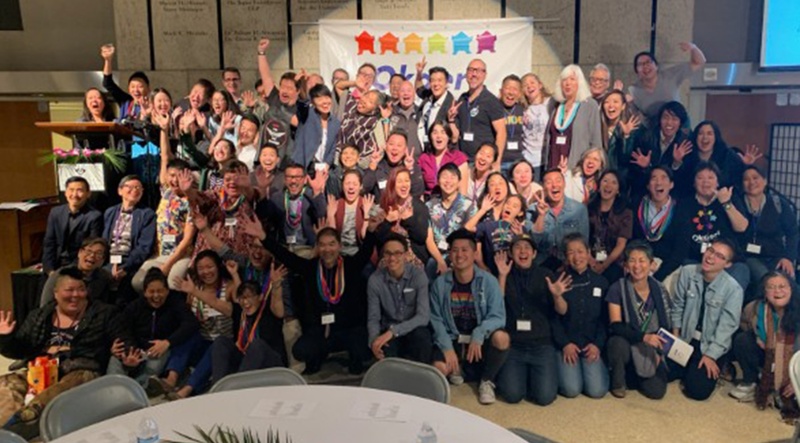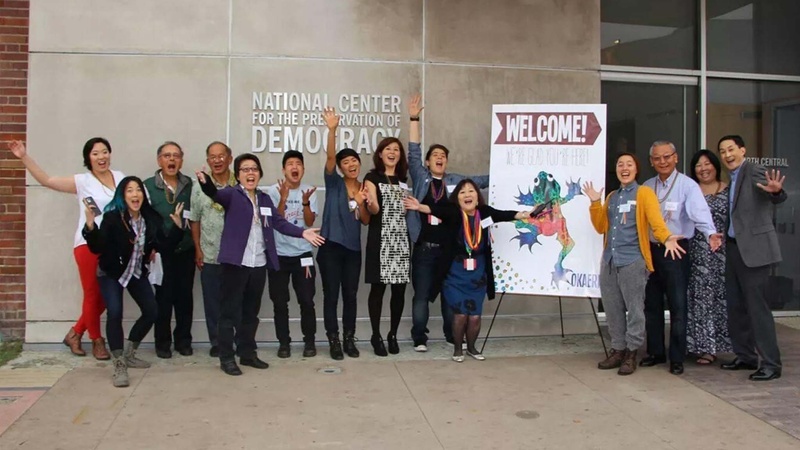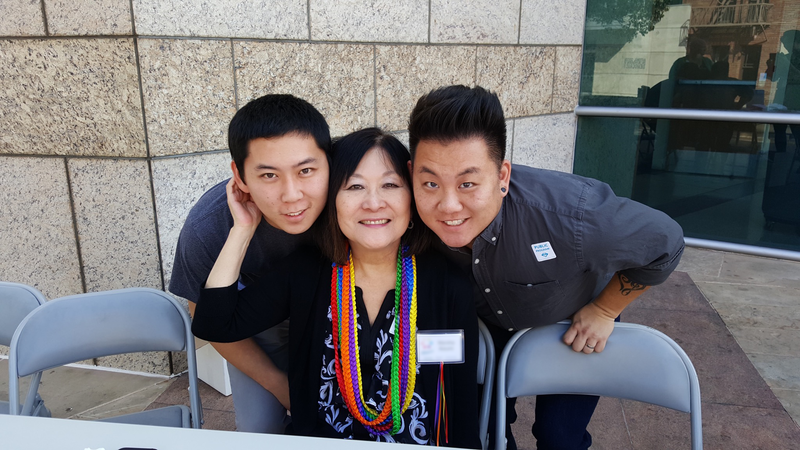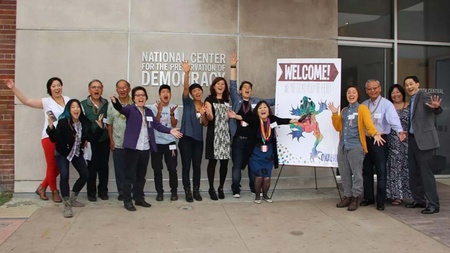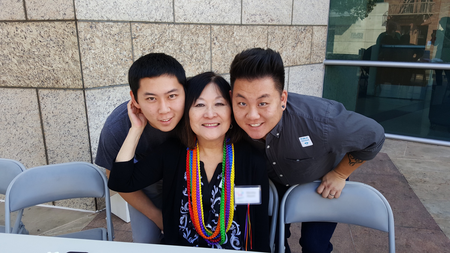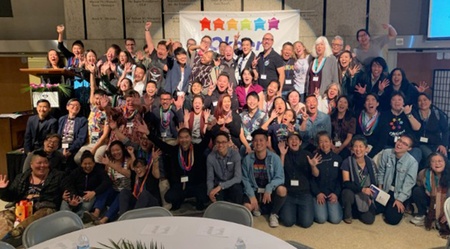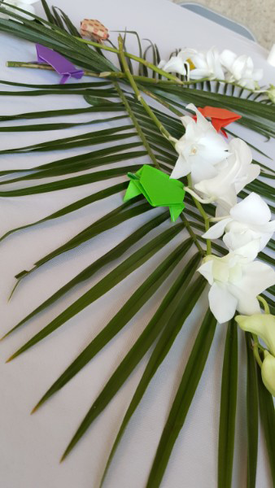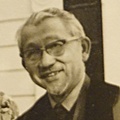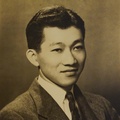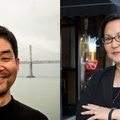I am a Japanese American, and I am a gay man.
For most of my life, the intersection between those two identities has been claustrophobically thin, leaving me never feeling completely at home in either space. The Nikkei community has been a comforting base for me, but it’s also generated painful homophobia. Similarly, the gay community has been the source of great joy, but it’s also been the site of hurtful racism.
Still, I could not sever my ties to either community because both are core parts of me.
Growing up in Gardena during the 1960s and 1970s, when that South Bay city was a Japanese American heartland, it was inevitable that Nikkei culture would be imprinted into my DNA. My childhood YMCA sports club was all Sansei. The Sunday evening youth services I attended at the Gardena Valley Baptist Church were filled with other Japanese Americans. I looked forward every summer to the Japanese Cultural Institute’s carnival, where I won glass candy dishes at the coin toss booth and ate fresh udon, a rare treat in the days before ubiquitous noodle restaurants.
The Japanese American community was reassuring, but it was also constricting. Being gay didn’t fit into the tightly-framed expectations of success that Gardena’s Japanese Americans demanded. High school classmates snickered behind the backs of effeminate students and made limp-wristed jokes. Church friends expressed disgust at the thought of gay people.
As a UCLA student in the early 1980s, I became involved in the movement for Japanese American redress. Among those progressive advocates, I heard disparaging comments about lesbians and gay men.
I learned it was not safe to be out.
After moving to Berkeley for graduate school in 1986, I remained active in Asian Pacific American community groups, but I also volunteered with gay organizations. Part of my coming out process involved providing practical and emotional support to people with HIV/AIDS through the Gay Asian Pacific Alliance Community HIV Project. In that organization, I met for the first time out Asian and Pacific Islander gay men. Two of them were Japanese Americans, one of whom would later die from AIDS.
Even in the progressive Bay Area, I didn’t feel completely comfortable being out in the Japanese American community. Still, I dragged my husband, David, to Japanese American church bazaars and obons. We knew that the Nisei women who made sushi at the Oakland Buddhist Temple cut thick slabs of mackerel for the saba sushi. We learned we could buy homemade tsukemono at the Enmanji Temple’s bazaar in Sebastopol. And we made sure we arrived at the Diablo Japanese American Summer Festival early to purchase fresh peach pie before it sold out.
We also attended fundraising dinners for the Bay Area’s LGBTQ+ community foundation and were members of a church whose congregation was largely LGBTQ+. But there were few, if any, other Japanese Americans in those spaces.
My Japanese American and gay lives intersected only within my family. After I met David in 2001, I brought him to gatherings of my large extended family. After Proposition 8 (an initiative on the 2008 California ballot) passed, thereby denying same-sex couples the right to marry, sympathetic cousins and aunties shared their dismay and their prediction that someday gay unions would be legal again.
But outside of my family, my Japanese American life and my gay life existed on parallel tracks.
I never anticipated moving back to Southern California, but in 2015 David accepted a job in Los Angeles, and we moved from Oakland. Soon after settling into downtown LA, a Bay Area friend introduced me to Marsha Aizumi, founder of Okaeri, a group which since 2014 has organized large biennial gatherings at the Japanese American National Museum for LGBTQ+-identified Nikkei. Marsha invited me to attend a planning meeting for the 2016 Okaeri conference.
At that meeting in an upstairs room at Centenary United Methodist Church in Little Tokyo, I flashed back to similar gatherings of Japanese Americans: my mother’s ikebana club, Bible study groups, and planning sessions for the redress movement.
But this meeting was different. I had never been with so many queer-identified Nikkei in one room. I had found the long-lost tribe from whom I was separated at birth.
Okaeri, which means “welcome home” in Japanese, is an apt name for the group. And it was also an appropriate term for that moment in my life. Soon after returning to Los Angeles, I found a space where I could integrate my Nikkei and gay identities and feel fully at home.
Through Okaeri, I’ve met many other gay Japanese American men. We’ve talked about how our lives would have been different if we had known out gay Nisei men when we were growing up. We’ve swapped stories about the racism we experienced in the gay community, from outright rejection because of our race to fetishization of our race, and the homophobia we experienced in the Nikkei community, from family denunciation to awkward silences after introducing our partners at Japanese American gatherings.
At Okaeri conferences in 2016 and 2018, nearly 300 LGBTQ+-identified Nikkei, our supportive family members, and allies from across the country came together as a community. We were free to be our full selves, knowing that others in the room would understand jokes about Ru Paul’s Drag Race, as well as references to Manzanar and Nikkei basketball leagues. It was particularly healing for many of us to be with parents, Nisei and older Sansei, who attended to support their queer-identified children. They represented the families many of us wish we had.
At each gathering, we were embraced as our complete selves. It was as if we were walking into our childhood homes after a long journey, taking off our shoes in the entryway, smelling the braided aromas of steamed rice and teriyaki chicken, and hearing a joyously excited voice shout from the kitchen a word to make us feel enveloped in love: Okaeri!
For More Information About Okaeri:
Before the COVID-10 pandemic, plans were underway for a large Okaeri gathering to take place in September 2020. That conference has been postponed until sometime in 2021. In the meantime, please visit Okaeri’s website or follow Okaeri’s social media for announcements about Okaeri’s online programs.
*This article originally appeared in the “Summer of Love” issue of Yo! Magazine, an online zine celebrating and exploring Japanese American stories, food, and culture.
* * * * *
Coming Out and Coming Home: Documenting the Voices of Queer Japanese Americans
Virtual Program
September 26 at 2:00pm (PDT)
Hear from four LGBTQ+ Japanese Americans who are forerunners of making Nikkei communities more accepting: Melvin Fujikawa, Gary Hayashi, Bill Tashima, and Mia Yamamoto. They will be in conversation with moderator Aya Tasaki. This virtual discussion will also include Barney Cheng, the award-winning filmmaker who directed "Okaeri Voices: An Oral History Project," a series of short Okaeri-produced documentaries about each of these figures that will be available for streaming during Visual Communications’ upcoming Los Angeles Asian Pacific Film Festival.
This program is presented in partnership with Okaeri and Visual Communications.
For more information and to RSVP >>
© 2020 Stan Yogi


